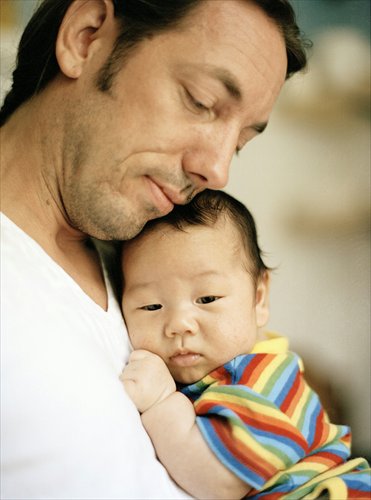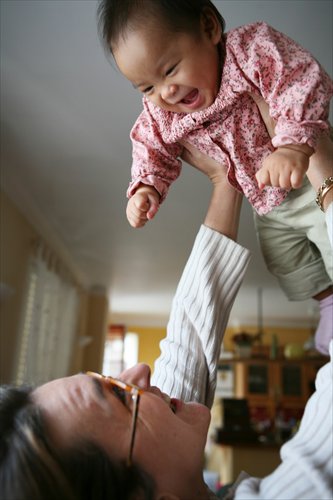HOME >> METRO BEIJING
Homes for the abandoned
Source:Global Times Published: 2015-8-2 19:48:02
More foreign couples adopting disabled Chinese children

More than 90 percent of the abandoned children waiting to be adopted in China are disabled. Photo: IC
"Momma," said Lucy timidly, a 6-year-old Chinese girl with Down Syndrome, when she arrived in Houston, Texas in the US and met her adoptive parents on July 20. It was the first time she saw American couple, Brent and Audrey Shook, reported the Daily Mail.
Audrey Shook, overcome by emotion, replied, "Hi. I'm momma," breaking down into tears and clutching the girl tightly.
The couple, who already have five biological children, had always intended to adopt a child from China. They saw a video of Lucy on the website of Great Wall China Adoption, an adoption agency based in Texas, which finds adoptive families for both healthy and special needs children. The Shooks knew instantly that Lucy was the one, and could not wait to give her a home.
The Shooks are among more and more foreign couples willing to adopt Chinese children with special needs.

There are increasingly more foreign couples adopting abandoned and disabled Chinese children. Photo: IC
Momma from overseas
According to the data on the official website of the Ministry of Civil Affairs, by the end of 2014, more than 110,000 abandoned children were adopted by foreign families. Although there is no detailed data of how many of them are special needs children, children's homes and adoption agency staff say special needs children are more likely to be adopted by foreign families than Chinese families.
"Ninety percent of our children have some level of disability," said Wang Tingjian, director of Dalian Social Welfare Institution, which is located in Dalian, Liaoning Province.
Wang said Chinese adoptive parents prefer children under the age of two, and the children must be healthy.
"Foreign families on the other hand don't usually have additional requests. I think it is not only related to the welfare policies of different countries, but also people's awareness."
Chinese Children Adoption International (CCAI) is an international adoption agency connecting American parents and Chinese children. The agency was established in 1992, and has helped more than 11,800 abandoned Chinese children find new families in the US. Special needs children account for over 90 percent of the total number of adoptions, according to the Southern People Weekly Magazine.
In March, CCAI sent its 2,173rd group of international adoptive parents back to the US from Henan Province. Nine of the children in that group had special needs. Special needs children abandoned by their biological parents usually suffer from either poliomyelitis, imperforated anus, cleft lip and palate, congenital heart disease or are HIV positive, said the Southern People Weekly Magazine.
One couple in the group, Daniel and Caroline from Los Angeles, adopted a healthy Chinese boy three years ago from Zhumadian, Henan Province. They recently returned to the same welfare institution to adopt a girl, this time one with serious congenital heart disease.
"That day when we picked up our adoptive son Maluo, he was playing under a tree with his best friend Tingting," Caroline told the Southern People Weekly Magazine. "She just looked at us blankly, did not cry or smile, and her eyes bore into our hearts and we felt her pain. We could not forget her eyes, and decided to return to China again and adopt her."
The couple did not mind that the girl had a weak heart, and took her to have surgery. Now she is much healthier and happier than before.
More special needs children
In 2014, 95 percent of children adopted through CCAI suffered from serious diseases and disabilities.
"Over 98 percent of the children in orphanages now are special needs children. Before 2008 the proportion was 20-30 percent," Nie Lili, one of the founders of CCAI, told the Southern People Weekly Magazine. "They are mostly older than what Chinese parents want, so generally they are unlikely to be adopted by Chinese families."
According to a 2013 Nandu Daily report, less and less healthy children, especially girls, are abandoned in China nowadays. Yet, despite societal development, disabled children are still often abandoned. Few Chinese families want to adopt a disabled child with the result that more and more of them are being adopted by foreign families.
The report goes on to say that from the beginning of the 1990s until 2005, children adopted by foreign families were mostly healthy girls. Given the country's strict family planning policy, people are more likely to want a boy, so many parents abandon their newborn girls. From 1995 to 2005, families from the US adopted over 60,000 Chinese children. However since the family planning policy was relaxed in 2005, less girls are being abandoned. At the same time, more Chinese families have been adopting healthy children, making it harder for foreign families couples to adopt a healthy child.
According to regulations of the Ministry of Civil Affairs, foreign applicants wanting to adopt a Chinese child should first register with a government-approved adoption agency in their country of residence. The foreign adoption agency will then contact a Chinese adoption agency entrusted by the Chinese government and transfer the application and related documents.
The documents include the birth certificates of all family members, marriage certificate, proof of property ownership, income and career, medical examination results and medical history, criminal record, motive for the adoption and a statement on why they are confident that they can give the adopted child a happy family.
"You would get an ideal adoptive child in China years ago, but the situation is different now. Most children are older, with a certain level of disability," Andrea Brezonsek, director of the Adoption Department of Médecins du Monde (Doctors of the World), the largest international adoption NGO in France, told the Nandu Daily. "In France if you want a healthy Chinese adoptive child aged under 3, you have to wait at least 6 years."
Welfare system to be improved
According to a report on the welfare of Chinese children released in 2010 by the China Philanthropy Research Institute at the Beijing Normal University, every year about 100,000 children are abandoned in China, most of whom are disabled infants.
Gao Yurong, deputy director of the institute said that in China a very ill or disabled child may be too much of an economic burden for the family, and therefore abandoning the child appears to be the easiest solution.
"Abandoning disabled children reflects that the health care and child welfare systems in China are still not perfect," Gao told the Southern People Weekly Magazine.
"Although China's criminal law states that abandoning children may lead to criminal charges, few parents have been punished, so the deterrence effect of the law is not obvious."
Nie Lili and her husband Zhong Hui adopted a 9-year-old girl with serious heart disease in 2004. Because of her condition, her IQ was at the level of a 2-year-old. But now, with the unconditional love and care from the couple, the girl, who is now 20, is attending a community university in China and learning to be an art designer.
"You will never know what the families are going through until you adopt a special needs child yourself," said Nie. "You can only feel the pain and gain when you choose the same road as other families who adopt. There is really love for no reason."
Zhong said that in the future, with the improvement of the welfare system and policies for abandoned and disabled children, fewer Chinese children will hopefully be abandoned by their parents.
"I will be glad to see the day when no Chinese children are adopted by foreign families and my wife and I consequently lose our jobs in international adoption", said Zhong.
Global Times - Agencies
Posted in: Metro Beijing